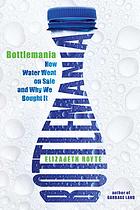****************
Garbage Land: On the Secret Trail of Trash
 "Out of sight, out of mind ... Into our trash cans go dead batteries, dirty diapers, bygone burritos, broken toys, tattered socks, eight-track cassettes, scratched CDs, banana peels.... But where do these things go next? In a country that consumes and then casts off more and more, what actually happens to the things we throw away? In Garbage Land, acclaimed science writer Elizabeth Royte leads us on the wild adventure that begins once our trash hits the bottom of the can. .......... By showing us what happens to the things we've "disposed of," Royte reminds us that our decisions about consumption and waste have a very real impact-and that unless we undertake radical change, the garbage we create will always be with us: in the air we breathe, the water we drink, and the food we consume." summary from goodreads.com image from worldcat
"Out of sight, out of mind ... Into our trash cans go dead batteries, dirty diapers, bygone burritos, broken toys, tattered socks, eight-track cassettes, scratched CDs, banana peels.... But where do these things go next? In a country that consumes and then casts off more and more, what actually happens to the things we throw away? In Garbage Land, acclaimed science writer Elizabeth Royte leads us on the wild adventure that begins once our trash hits the bottom of the can. .......... By showing us what happens to the things we've "disposed of," Royte reminds us that our decisions about consumption and waste have a very real impact-and that unless we undertake radical change, the garbage we create will always be with us: in the air we breathe, the water we drink, and the food we consume." summary from goodreads.com image from worldcat********
As I read this book I got the feeling that often we're just shifting our trash from one place to another. Evidently only 2% of all garbage is household waste. "The rest of it [waste] is industrial, primarily manufacturing and commercial, mostly restaurants and fast food outlets. ... for every 100 pounds of manufactured goods, 3,200 pounds of waste are generated." source
When I drop something into the garbage or recycling container, I wonder about its final destination.
**************************************
Bottlemania: How Water Went on Sale and Why We Bought It
by Elizabeth Royte
read more at goodreads.com
"An investigation into the commercialization of drinking water traces the process through which companies acquire, bottle, and market water, in an account that addresses such issues as the risks of water-decontaminating practices." (summary & image from worldcat.org)
read more at goodreads.com
thought-provoking questions
"Is it right to trade water at all, to move it from its home watershed to other states, or even countries? Should the taxpayers who protect land and water share the profits of those sho pump and sell that resource? How is water different from such resources as oil, trees, or lobsters?" (15)
“… who controls what’s left of our freshwater – locals who depend on it for survival, or corporations that sell it for profit – matters a great deal, whether that water comes from an aquifer in western Maine, or an aquifer in the Philippines, … where companies have already privatized either supplies or delivery systems." (53)
If people switch to bottled water will there be support for public water supplies and infrastructure to provide safe tap water?
Elizabeth Royte's blog
Elizabeth Royte's website
Elizabeth Royte's blog
Elizabeth Royte's website

No comments:
Post a Comment